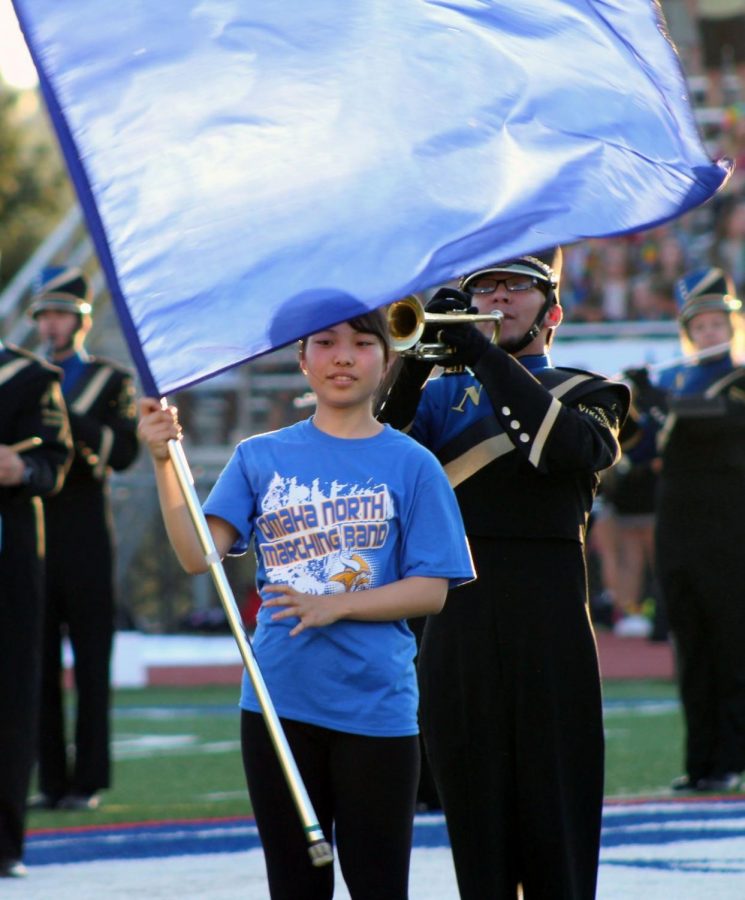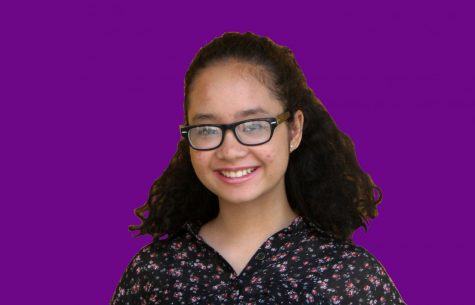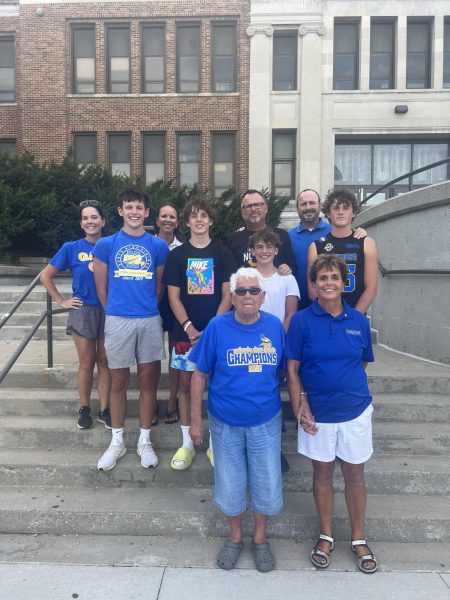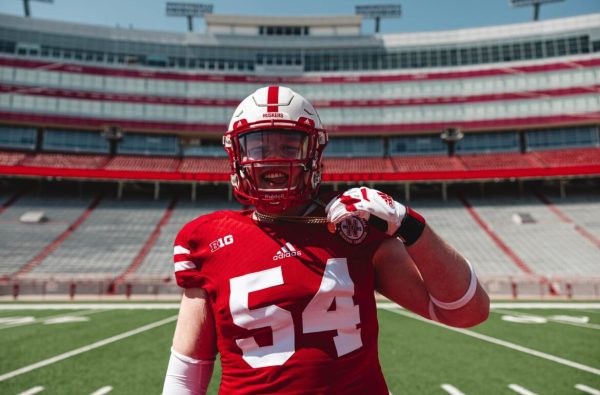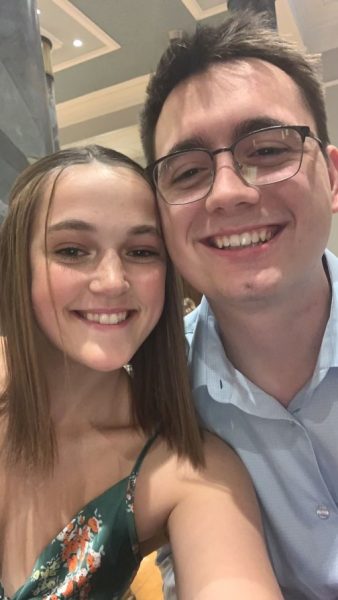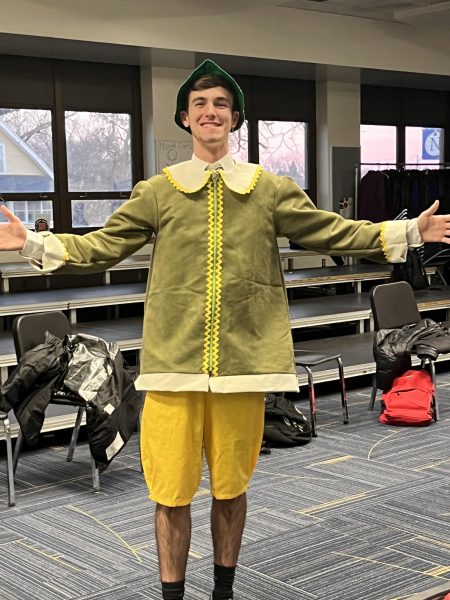Nozaki finds new home 6,000 miles from Japan
Junna Nozaki, 12, holds the flag for color guard at the North vs. Burke football game on September 14, 2018. Japan does not have color guard or football, so these are new experiences for Nozaki. Photo by Caitlin Pieters
October 26, 2018
Junna Nozaki, 12, is currently part of Sister Cities International, an exchange program to improve her English and gain a better experience of the world.
“English is a widely used language that could be very helpful to me in the future,” said Nozaki.
Nozaki became intrigued with the English language when her cousin, who is like an older sister to her, started to learn the language.
“I was very surprised and thought it was cool. I longed to speak English,” said Nozaki.
Nozaki has been studying and taking English classes for seven years. She took the opportunity to join Sister Cities International and do an exchange to Omaha for her last year of high school.
Before coming to America, Nozaki went to Tokowa High School, an all-girls school in Shizuoka Prefecture. Nozaki and her family were very anxious for her to come to Omaha since it was a bigger place than they were used to.
With the financial and emotional support from her family, Nozaki was able to come to America to further her studies and put her seven years of English studies to use.
“My parents are always worried about me, but they hope this experience will make a big growth in my life,” said Nozaki.
When Nozaki first came to America and started school, there was a language barrier between her and her peers which caused her to feel isolated.
“[The Students] are very kind but I don’t have many friends so sometimes I eat lunch alone and feel sad,” said Junna Nozaki, a foreign exchange student from Japan explaining how she’s having trouble making friends because of the language barrier.
Her inability to hold a conversation with them at the beginning of the school year caused her to think her English is still “immature.”
“American speaking speed is very fast! So, it is hard for me to understand and hear what they are saying,” said Nozaki.
Nozaki explained that the Rs, and Ls in English are hard for her to pronounce along with understanding Americans’ accent.
“Japanese have a hard time with Ls and Rs and she also doesn’t speak very loud and that can be hard when we are trying to say something like do you want extra cheese on your taco and she is on the other side of the house,” said Quinton Schievelbein, 10, Nozaki’s host brother.
Schievelbein explained that when Junna first came to America she was very quiet, and they would have short greetings instead of conversations, but over time she started talking more to him about hobbies they shared, like Anime.
Although Nozaki is still having trouble communicating with others because of the language barrier, she is quickly adapting to American’s culture and communicating to others more.
Schievelbein explained that when Nozaki is feeling homesick she goes over to Jonah Adams’, 10, house to talk in her home language. There, she talks about things she likes such as hamburgers and pizza.
Nozaki is slowly communicating more to others such as stating what she wants. An example would be when she went up to a member of her color guard team to tell them she wants to do tricks with the flags.
Nozaki explained that being in a diverse crowd helped her open and gain more confidence because typically in Japan she would stick to her family and group of friends.
Her host brother explained Nozaki as a “down to earth,” and “smart” person who is very good at observing her surroundings. One of her strength is being an active listener.
“She is definitely an observer, she does not feel the need to talk in every conversation because she knows that not every conversation needs an extra person and you can learn more by listening than talking,” said Schievelbein.
Schievelbein explained that whenever Nozaki has trouble getting her point across, she’ll slow down or rethink her words. If that still isn’t working for both parties, she’ll write down what she’s trying to say.
Even though she has only been in school for a month, Nozaki is slowly adapting. One of the main differences she has had to adapt to is the differences in the ways classes are set up.
Nozaki explained that students will stay in one classroom while teachers for different subjects will come in and out. Classes are only 50 minutes because she has seven classes on Monday and Wednesday and six classes on Thursday and Friday.
Schievelbein explained that Nozaki is a fast learner, adapting not only physically but also mentally.
“Every time I would do a new algorithm for a different look on the [rubix cube] or ways to solve it she almost immediately was able to look at the cubing annotation and tell you how to turn the cube, and then solve it with surprisingly few mistakes,” said Schievelbein.
Nozaki is talking more to her classmates, but she also has fellow Japanese exchange students who are doing exchanges in Omaha. They hang out every weekend, so they can still have fun while living in a foreign country.
“I’m raising my motivations along with my friends because we all want to speak English well. We are all supporting each other,” said Nozaki.
Nozaki explained that even if it gets lonely sometimes, and overwhelming, she will still greet others. She believes that one of her strong suits is being friendly and greeting other people.
“Be the friendliest you can be,” said Nozaki, a message to other students who are having a hard time fitting in.
Interview assisted/ translated by Jonah Adams


